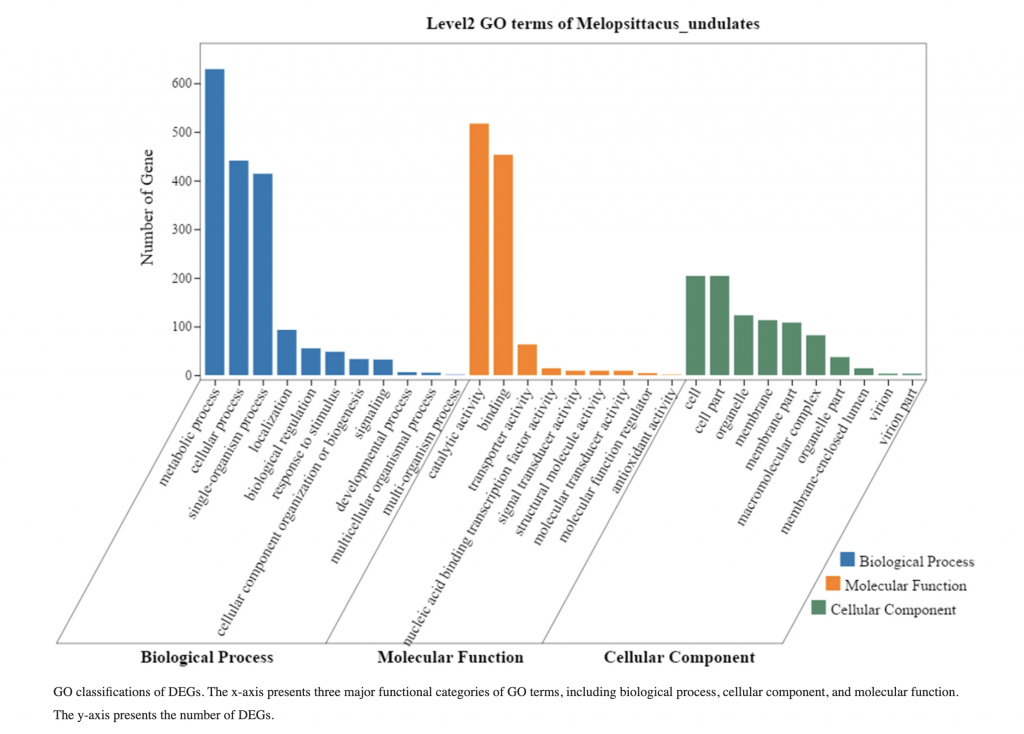
As Antonella Longo was peer-reviewing a study for the journal Plant and Soil, she became “alarmed by one figure.” The figure’s title — ”Level2 GO terms of Melopsittacus_undulates” — seemed to be a misspelled reference to a bird species called Melopsittacus undulatus.
More commonly known as a budgie or parakeet, undulatus is a vibrantly colored parrot found in scattered parts of Australia. So what was a figure about a bird doing in a study about plants?
Concerned, Longo, of the BioDiscovery Institute at the University of North Texas, searched the internet for words used in the figure, “GO terms of Melopsittacus undulates.” She identified at least three additional studies that contained an image similar to the one in the study she was peer-reviewing, each with an identical title and color scheme, but with varying data. None of the studies are about birds.
In addition to the manuscript Longo reviewed for Plant and Soil, the image appears as Figure 5 in “Comparative transcriptome analysis of Sclerotinia sclerotiorum revealed its response mechanisms to the biological control agent, Bacillus amyloliquefaciens,” published in July 2020 in Scientific Reports, as Figure 3 in “Comparative transcriptome profiling reveals cold stress responsiveness in two contrasting Chinese jujube cultivars,” published in May 2020 in BMC Plant Biology, and as Figure 7 in a preprint, called “Full-length Transcriptome Sequences and Identification of Putative Genes for Carotenoids Accumulation in Polymorphic Noble Scallop Chlamys Nobilis,” which was posted in August 2020. None of the published studies have been cited, according to Clarivate Analytics’ Web of Science.
Longo says she raised her concerns about the image to editors at Plant and Soil during the review process:
I pointed out the problem to the editors and so far, the review process is proceeding. At this point we are at the second round of the review process. I shared my concerns. It seems like the paper will be accepted after all.
The authors of the study under review said “that only the label is not correct,” according to Longo, but that their data are otherwise accurate.
The lead author for the study published in BMC Plant Biology, Xiaoming Pang, offered various explanations for the source of the figure. In an initial email to Retraction Watch, Pang, who is a professor at the Beijing Forestry University in China, said, “If you look closely, the three images you mentioned are all different.” In a second email, though, Pang acknowledged that the title of the figure was incorrect, and said that he would ask the journal to fix the mistake:
Our image was made by Sequencing Company based on our own data. I am sorry that we have not found the mistakenly [sic] using the image title. I think the company just filled individual data to software using a template, which may resulted [sic] in the same wrong title in three papers. We will ask the journal to correct this.
In a third email, Pang revised his explanation:
I just talked with the first author and actually she made the images by herself in a free online platform (https://www.omicshare.com/), which is a popular free platform. Unfortunately, she did not notice the title, neither did I. But the image was corresponding to our data.
The authors of the study under review, in Plant and Soil, also said that they made their figure using OmicShare, according to Longo, and that “the figure label was added by the software in default [sic].”
The lead author of the preprint that includes the figure, Huaiping Zheng, said that their image “was constructed by BIOMARKER sdn, China based on our data.” Zheng, who is a professor at Shantou University in China, has not provided further details in response to additional questions; namely, whether BIOMARKER is a reference to a company or something else. Authors of the other study, in Scientific Reports, did not respond to our requests for comment.
We sent a request for comment to an editor at Scientific Reports, who forwarded it to a PR spokesperson for Springer Nature, the publisher of the journals where the three studies appeared. They said that the company will look into the images:
We appreciate you making us aware of these concerns and we are currently looking into them, as we do for all concerns that are sent to us. For confidentiality reasons, we cannot discuss the specific history or review process of the paper.
For Longo, the homogeneous images offer a frustrating lesson in slapdash science:
A lot of sloppy authors don’t check labels.
Like Retraction Watch? You can make a tax-deductible contribution to support our work, follow us on Twitter, like us on Facebook, add us to your RSS reader, or subscribe to our daily digest. If you find a retraction that’s not in our database, you can let us know here. For comments or feedback, email us at [email protected].
Here is a OmicsShare forum post from March 2020 which seems to say that this was the standard title, but someone with more Chinese knowledge than me can probably understand more.
https://www.omicshare.com/forum/thread-5973-1-1.html
Who is the editor with whom you are dealing?
What is their affiliation?
So many shoddy papers getting through in NSR.